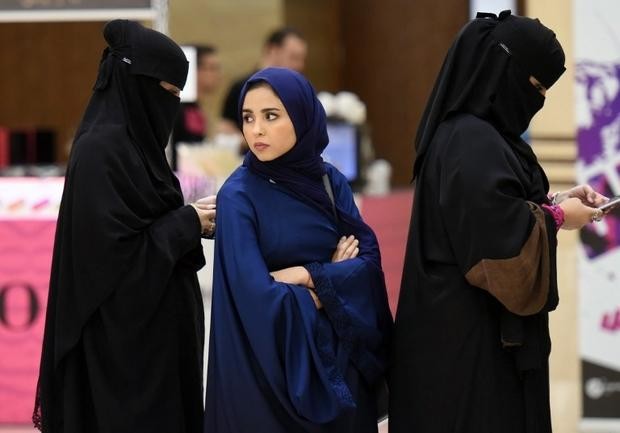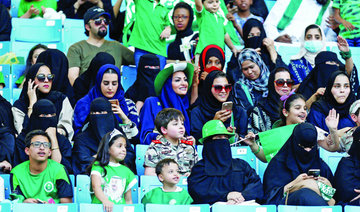JEDDAH: The General Court in Riyadh amended the decision to limit the entry inside the court to veiled women. Women can now enter courts without the need to cover their faces, as long as they dress modestly and adhere to the court’s dress regulations.
The court replaced a circular issued last year by the court’s president in which he stressed that women would not be admitted to the court if they are not dressed appropriately in revealing garments or without the face being covered.
Shoura member and associate professor at King Saud University Dr. Eqbal Darandari told Arab News: “Any applicant frequenting a government department is expected to uphold and adhere by its dress code. Courts of law, specifically, are governed by religious sanctions, which calls for women to dress accordingly in modest attire.”
In response to the news she said: “That, however, does not mean that we restrict all women under a specific Islamic sect, as there have always been differing opinions and sects when it comes to hijab. I’m sure everyone is grateful and appreciative of such a decision, as it helps the court to provide women with all needed services.”
She also believes it will enable women to feel more comfortable in frequenting courthouses, for when they dress as they regularly do, they’ll feel welcome and at ease.
Hala Abdullah from Riyadh told Arab News: “I was ecstatic, of course. It’s not just a step in the right direction – it’s completely necessary and couldn’t have come sooner. Proper representation of women in the courts of law cannot take place if we’re literally and figuratively invisible. We need to be seen.”
@iPhonjy responded with a tweet saying: “Finally, true Islam is slowly but surely returning to Saudi Arabia.”
General Court in Riyadh retracts ban on unveiled women
General Court in Riyadh retracts ban on unveiled women

How Saudi Arabia is pioneering soil quality and water conservation solutions

- SandX is a biodegradable sand coating that reduces water evaporation by 80 percent using nature-inspired technology
- CarboSoil is a breakthrough in soil amendment and carbon capture, enhancing plant growth and reducing emissions
JEDDAH: For more than a decade Saudi Arabia has invested in sustainability, implementing groundbreaking initiatives to combat desertification, improve soil quality and preserve water.
These efforts are transforming the Kingdom’s landscape, aligning with the broader goals of the Saudi Green Initiative.
One of the most ambitious projects is King Salman Park in Riyadh — one of the world’s largest urban parks. The initiative focuses on increasing green spaces, restoring soil health and mitigating the urban heat island effect.

Native tree planting and sustainable water management systems are key components, ensuring long-term environmental benefits.
Meanwhile, on the Kingdom’s east coast, Saudi Aramco has spearheaded efforts to manage soil erosion, improve water retention and enhance biodiversity.
But it is in the laboratories of King Abdullah University of Science and Technology where cutting-edge technology is shaping the future of sustainable soil solutions.

Himanshu Mishra, an associate professor at KAUST, has spent the last decade addressing some of Saudi Arabia’s biggest environmental challenges. A specialist in water properties, his early research led him to an eye-opening realization about the Kingdom’s water usage.
“When I came to Saudi Arabia, I learned about the stress on water,” Mishra told Arab News. “Somebody told me that 80 percent of Saudi Arabia’s water is used for food production, yet (the country) is importing most of its food. That just blew my mind. I was disturbed by it.”
Inspired by nature’s ability to repel water, Mishra co-founded SandX, a biodegradable, water-repellent sand coating designed to reduce water evaporation.
The technology mimics nature’s super water-repellent surfaces — like butterfly wings and bird feathers — to create a revolutionary material.
“This material, it hates water. It absolutely hates water,” said Mishra. “This is SandX, and water doesn’t penetrate it.

Each grain of SandX is coated with a nanoscale layer of biodegradable paraffin wax, reducing water evaporation by over 80 percent without the use of plastics. “Bacteria will eat the wax, so SandX will become sand again,” Mishra said.
“No one has ever done this in Saudi Arabia. We are the engineers, the first ones to do that. We are pioneers in this.”
Water scarcity, however, is only part of the challenge. “Do you know how old this water is?” Mishra asked, holding up a bottle. “This water is older than our planet. We have limited water resources, but we still have some resources. What we don’t have (are) fertile soils.”

Green spaces in Saudi Arabia are heavily dependent on imported peat moss, he said, a practice that is not only expensive but also counterproductive to sustainability.
“You import so much peat moss every year — it’s a multi-million-dollar market. And you rely on these imports. It defeats the whole purpose of sustainability.”
To address this, Mishra developed CarboSoil, a groundbreaking soil amendment and carbon capture technology derived from organic waste.

Unlike traditional compost, which eventually releases carbon back into the air, CarboSoil locks carbon into the soil while enhancing plant growth.
“This is the only technology known to humanity that does soil amendment and carbon capture at the same time,” he said.
Field trials for CarboSoil are ongoing, with production scaling up following a KAUST Innovation and Economic Development grant. Mishra believes the impact will be transformative.
“Our technology will contribute to food production and greening projects in arid regions,” he said. “When you apply it on plants, they grow bigger and stronger — like 60 percent bigger, with wider trunks. Enhanced food production. Enhanced yields. That’s additional carbon capture.”

Looking ahead, Mishra envisions Saudi Arabia leading the world in carbon dioxide removal.
“I can guarantee you that as we continue to scale up this production under the stewardship of the Ministry of Environment, Water, and Agriculture, in less than five years, Saudi Arabia will be ranked number one in carbon dioxide removal deliveries on the planet.”
The startup’s ambitions extend far beyond the Kingdom. “Right now, our goal is to contribute to the landscaping and green sector in the Kingdom,” he said.
“In phase three, we start building factories for poultry farms, date farms, and other industries. Phase four is we will expand to the wider Middle East.”

Saudi aid center distributes 3,800 boxes of dates in Aden

- The center distributed 300 food baskets in Costanta, Romania, benefiting 1,500 individuals.
ADEN: The King Salman Center for Relief and Humanitarian Aid recently distributed 3,800 boxes of dates across the districts of Mansoura, Sheikh Othman, and Dar Saad in Aden province, Yemen.
The distribution benefited 22,800 individuals, including displaced persons and people with special needs, as part of KSrelief’s 2025 date assistance distribution project in the country.
The center also distributed 300 food baskets in Costanta, Romania, benefiting 1,500 individuals. This is part of the Etaam Food Basket Distribution Project.
These initiatives are part of the Kingdom’s relief and humanitarian efforts carried out to support those in need and alleviate suffering worldwide.
Saudi deputy foreign minister meets Chad’s president

- Al-Khuraiji conveyed to Deby and his people greetings and well wishes from King Salman and Crown Prince Mohammed bin Salman
AMDJARASS: Saudi Arabia’s Deputy Foreign Minister Waleed Al-Khuraiji met recently with Chad’s President Gen. Mahmat Idriss Deby Itno in Amdjarass.
Al-Khuraiji conveyed to Deby and his people greetings and well wishes from King Salman and Crown Prince Mohammed bin Salman.
During the reception, the officials reviewed bilateral relations and discussed the latest global developments.
The reception was attended by Chad’s Foreign Minister Abdullah Saber Fadl, and several other ministers and officials of the African nation.
Also present was Ali bin Hassan Jafar, Saudi Arabia’s ambassador to Sudan.
Attempt to smuggle 22,496 unlicensed pills foiled in Saudi Arabia’s Jazan

- Security authorities call upon citizens and residents to report all available information about any activities related to drug smuggling or selling
JAZAN: Al-Afwaj security patrols in Jazan foiled an attempt to smuggle 22,496 unlicensed medical pills and 3 kg of hashish in Faifa Governorate. The seized narcotics were handed to the relevant authority.
Authorities in Jazan arrested a violator of the border security system, of Ethiopian nationality, for promoting amphetamine. Preliminary procedures have been completed and the offender referred to the competent authority.
Land patrols of the Border Guard in Al-Raboah in the Asir Region led to the arrest of six violators of the border security system, of Ethiopian nationality, for smuggling 120 kg of qat. Preliminary procedures have been completed, and the seized narcotics handed to the relevant authority.
Security authorities call upon citizens and residents to report all available information about any activities related to drug smuggling or selling. They can contact the General Directorate of Narcotics Control by calling 911 in Makkah, Riyadh, and the Eastern Region, or 999 in the other regions. The organization can also be contacted by email.
Taif governor meets plants cooperative members

- The prince was briefed on the association’s recent initiatives, as well as upcoming programs and activities
TAIF: Taif Gov. Prince Saud bin Nahar met with Abdulrahman Al-Sherbi, president of the Rose and Aromatic Plants Cooperative Association, in the presence of representatives from relevant government agencies.
During the meeting, the prince was briefed on the association’s recent initiatives, as well as upcoming programs and activities.
The governor commended the collaborative efforts between government and public entities, highlighting the uniqueness of Taif’s roses and aromatic plants and their potential on the international stage.






















